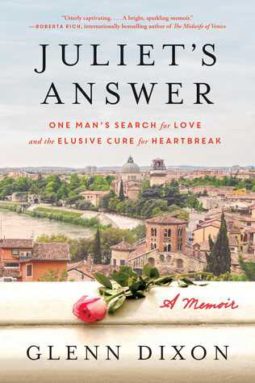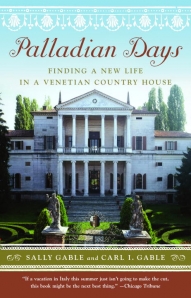This review contains affiliate links, which earn me a small commission when you click and purchase, at no extra cost to you. Thank you for supporting my small business and allowing me to continue providing you a reliable resource for clean book ratings.
Glenn Dixon taught high school English for two decades, which of course included introducing his students to the beauties of Shakespeare. Many times Romeo and Juliet was the course of study; he read sections with the students and had them act out fight scenes and the balcony scene. He got them excited about a story that’s been around for centuries.
His own love life was torturous; he had been in love with the same woman for years, and while they spent a lot of time together off and on as “best friends,” she didn’t return his romantic interest. So he decided to take some time to visit Verona, the scene of the tragic tale of young lovers at the mercy of their families’ feud. Modern-day Verona now receives upwards of 10,000 letters a year from lovelorn people needing answers from “Juliet.” And they get their answers: Volunteers in the city who call themselves “the secretaries of Juliet” painstakingly read every letter and craft responses, mailing them back out to the letter-writers all around the world. And Dixon joined the ranks of these “secretaries,” twice, in an effort to find answers himself.
In his memoir, he shares his own heartbreak, played out over about 20 years, and writes snippets of the many letters he received and responded to as a volunteer in Verona. He goes back and forth between his history with the woman, “Claire,” he loved; with his time in the classroom teaching the classic play; with his time in Italy, talking about the sites in the city, some of his fellow volunteers, and his search to find a solution to his heart’s desire.
The whole is a simple book that reminds us all that the search for love is universal and is often painful. It’s a small part travel guide, giving readers a peek into the beautiful old city. It even digs into some history and the possibility that a real Romeo and Juliet existed. But so much is Dixon’s complaints about his own miserable love life that it made me a bit irritated with him. At the end, he shares with a radio interviewer about the best way to respond to letter writers: “Sometimes you really want to tell these people to get it together, to smarten up — but of course you can’t say that. That’s not what they want to hear.” He goes on to say that it’s best to just allow them to share, to listen to them. Honestly, I wanted to do the same thing: just tell him, “For heaven’s sake, Glenn! Stop spending time with this woman who’s never going to love you back romantically, cut ties, and allow yourself to move on!!” Arrgggghhhh. So in essence, this book is all of us readers “listening” to him. And half of it is a bit annoying.
If you’d like a quick read that gives insights into Verona and Romeo and Juliet’s story, Juliet’s Answer is still a nice choice. But just be prepared to be aggravated at the author’s own love life.
Rated: Moderate, for three uses of strong language and some other uses of mild and moderate language. Sexual references are quite minimal. Violence is limited to discussions of fight scenes in Shakespeare’s play.
Click here to purchase your copy of Juliet’s Answer on Amazon.
*I received an advance e-copy of this book from NetGalley in exchange for an honest review.




